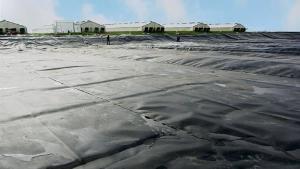Aug 12 2014
Construction is underway in Northern Missouri on an innovative $80 million renewable energy project, developed and constructed by Roeslein Alternative Energy, LLC (RAE) in collaboration with Murphy-Brown of Missouri, LLC (MBM) the livestock production subsidiary of Smithfield Foods, Inc.
 A lagoon cover installed at a hog production facility at Murphy Brown Missouri is part of an $80 million renewable energy project with Roeslein Alternative Energy LLC. (PRNewsFoto/Roeslein Alternative Energy, LLC)
A lagoon cover installed at a hog production facility at Murphy Brown Missouri is part of an $80 million renewable energy project with Roeslein Alternative Energy LLC. (PRNewsFoto/Roeslein Alternative Energy, LLC)
Crews are installing impermeable covers on 88 existing lagoons to harvest biogas, also called renewable natural gas (RNG), from MBM hog finishing farms using best in class anaerobic digestion technology developed and installed by RAE. The project is the largest of its kind, utilizing manure from one of the biggest concentrations of finishing hogs in the Midwest to create several hundred million cubic feet of RNG annually for regional distribution.
The project is a unique and innovative model for sustainability that will demonstrate how underutilized agricultural resources can create renewable fuel, benefit the ecosystem and generate economic opportunity.
"We are excited to see the results of our collaboration with Smithfield and Murphy-Brown begin to take shape. This project can be a model to show how both economic and environmental benefits can be gained by using manure in a different way," said Rudi Roeslein, president of Roeslein Alternative Energy and CEO of Roeslein & Associates, a global leader in systems integration specializing in sophisticated modular construction.
Anaerobic Digestion Creates a New Energy Source from Manure
Impermeable synthetic covers will be placed on existing nutrient treatment lagoons where barn scraper technology will deliver raw nutrients of livestock manure to covered lagoons. The covers turn the lagoons into anaerobic digesters, where naturally occurring microorganisms decompose the manure in an oxygen free environment. Biogas rises to the top where it will be collected and cleaned of impurities. What remains is more than 98 percent methane with approximately the same chemical composition as natural gas that can be used for vehicle fuel or injected into the natural gas grid system. The undigesteable solid residue can be used by local farmers as a natural fertilizer and the water can be safely used for irrigation.
"This project fits perfectly with our mission to not only to be responsible environmental stewards, but create a direct benefit to the community by helping create a product such as natural gas – a renewable, clean-burning fuel," said Bill Homann, director of administration for Murphy Brown Missouri. "Partnering with experts like Roeslein help us make projects like these a reality."
"There is value in the gas we capture as alternative vehicle fuel. There is even more value to the environment from reduced greenhouse gas emissions, eliminating rainfall effects on treatment systems, and odor reduction," Roeslein said.
RAE Anaerobic Digestion
Lagoon Covers Enable RNG Production in 2014
RAE retained Industrial & Environmental Concepts Inc. (IEC) to design and install the High Density Polyethylene (HDPE) lagoon covers with the initial 21 being installed at MBM Valley View and South Meadows farms in Northern Missouri by fall 2014. RNG production is expected to begin in late 2014.
RAE has engaged investment banking firm Stern Brothers & Co. to underwrite the entire financing for this project. Much of the equipment and process modules will be fabricated by local fabrication companies and Roeslein & Associates wholly owned subsidiary Roeslein Fabrication in Red Bud, Illinois.
In addition to using hog manure, RAE ultimately intends to produce RNG from cover crops harvested between growing seasons on prime agriculture land and grasses harvested from highly erodible farm ground converted to native grasslands. The concept creates an economic structure that better utilizes land assets, delivers significant environmental benefits, reduces soil erosion, benefits wildlife and improves water quality.